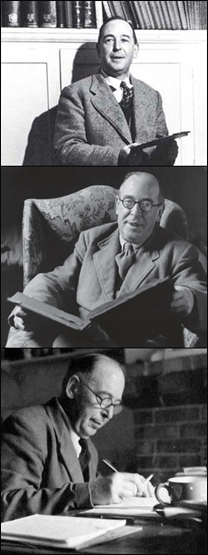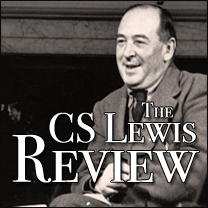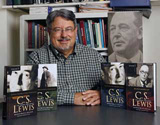
Interviews on My New Books
September 17th, 2005 | Skip to comments
Thought you might be interested in seeing my answers to some questions posed on a Narnia web site regarding my two new books and the Narnia movie. Here goes:
- How do you think the movie will impact Lewis’s legacy?
This movie promises to be a very excellent adaptation of Narnia, given the high production values, skilled director, and the integrity of Walden Media and Doug Gresham at the helm. The main thing is, if it will bring more readers not only to Narnia, but to the rest of Lewis’s works, which are uniformly thought provoking and excellent, it will be worth “the risk.” I am more excited that the movie(s) are being made than learning that “more” Narnian tales are being created by present day authors, who may not possess the Christian imagination that characterized Lewis’s life and work. It’s the quality of the person more than the re-assembling of Narnian characters that makes the difference.
- Will the movie attract new fans to Lewis’s other works?
We can hope so. Movies can be fickle; and are sort of “self-consuming artifacts,” as literary scholar, Stanley Fish (who also admires Lewis’s work on Milton), used to say of certain books. That is, movie have am elusive “presence” only when one is watching them. . . while the written word seems to have a more enduring and lingering quality even if the book is closed. The Lord of the Rings movies certainly elevated an already high profile Tolkien possessed. . . and, in my view, Lewis has so much more to offer the adventurous reader–not in terms of fantasy, but in all the other genres he mastered (literary criticism, satire, narrative poetry, dream-vision, science-fiction, memoir. . .) There is a feast awaiting any reader who only knows Narnia.
- How was Lewis’s writing able to become so powerful and memorable yet so simple?
Deceptively simple I would say–it takes a lot of hard work to make a work “seem” so simple. Quite honestly, I think it is Lewis’s lifelong perspicacious reading, which began in childhood (at age 3 no less!), that gave him much to draw on. He had an intrinsic sense of eloquence, but there is also no doubt that those authors who had the greatest impact on him when he was young (E. Nesbit or Beatrix Potter–as well as Chesterton and MacDonald) had a tremendous influence on his own composing. When I teach Lewis I also draw attention to mastery of the arresting metaphor–and his foundational tri-chotomies–the forced choice among three mutually exclusive options (liar, lunatic, lord) which he learned from St. Augustine and, I believe, William Kirkpatrick, his tutor in the last stages of his adolescent learning, whom he called The Great Knock, a little of whom is in Professor Kirke.
- How will your new books help readers and moviegoers better understand The Chronicles of Narnia?
One aim of mine was to prevent the possibility that Lewis’s Christian convictions, which inhabit and animate the Narnian landscape, will be “lost in translation” as the stories migrate from text to film.
I have endeavored in my books to take nothing for granted, making it my goal specifically to orient the willing reader new to The Chronicles (as well as the veteran sojourner there) to what we might call Narnia’s spiritual geography, that is, to its ultimately Christian themes, and, most assuredly, to its undeniable center: King Aslan, the Great Lion, Son of the Great Emperor-Beyond-the-Sea.
The goal is to travel on both sides of the wardrobe: to go “further up and further in,” to discover and remain in Aslan’s presence, following his lead, completing the missions he sets for us, and gaining glorious comrades along the way to share grand adventures in the Spirit. We want to know what it means to be a Narnian, so we can learn better how to be a Son of Adam or a Daughter of Eve.
My books pay their greatest homage to Aslan. Indeed, “He is not a tame lion,” as Mr. Beaver intones near the end of The Lion, the Witch, and the Wardrobe. By titling my works, Not a Tame Lion, and Further up and Further In, I am implying, no, stipulating, that without Aslan the Narnian adventures would have little meaning, certainly lesser value, and lack spiritual poignancy or potency.
- How does your book illuminate the rich meaning in the text?
I wanted in writing these works to provide both novice and experienced readers something that will increase their enjoyment every time they come to The Lion, the Witch and the Wardrobe (or the movie made of it). Neither work explores every possible detail you may want to know about Narnia because that is not its design, and, there is plenty to be discovered that this small volume could not possibly include. I had no incentive to provide encyclopedic coverage of each jot and tittle because
other volumes already do that.The truth is, literary encyclopedias provide a specific service and are useful particularly after we have put the book down. They represent an “outside-in” approach-forging facts and compiling connections exterior to the text and using them to interpret and elucidate what you have already read long after you have left the intimate setting of the book itself. They draw you naturally outside the world the tale has created; they occupy you with things and ideas and people the book points to and try to answer nagging questions you may have. And then, at their best, they will send you back to the text for more interaction with Aslan and his creation. But at their worst-and I am afraid this is what most encyclopedias do-they may take you “further out and further away” and, in this case, force you to remain an outsider to the continuing experience of Narnia. (One can become an “expert” on Narnia, so to speak, without ever living there. What a pity!)
- And finally, why is an exploration into the spiritual dimensions of Narnia so important?
A large part of what makes Narnia terrific, engrossing, and life-changing is its ability not only to deliver a world that is strange and compelling but also to make our own world strange and compelling as well. Its genius, if you will, is its ability to make us long for a world like Aslan’s and then to help us discover in ours the evidence that Aslan has been here too and motivate us to uncover the implications of that visit. A Narnian sojourn makes us dissatisfied with our world for all the right reasons and then points us to a pathway to our true home and our true identity. Indeed, that is what any reading of The Chronicles ought to evince and maybe even what a book about Narnia should do as well!
That indeed is my challenge both works. I am attempting what I call an “inside-out” approach, designed to increase your appreciation for the strangeness and oddness of what is going on inside Aslan’s story on several levels while we are inside Narnia, not outside of it. I don’t want you to spend a minute more outside the text than you have to because our time in Narnia is too precious to waste in search of external sources. The Chronicles tell a simple story on the surface but one that is actually clever and complex and thus one that repays many visits and rereadings. At the same time,
because of those very revisits, our experiences threaten to become commonplace and ordinary. My job is to help you keep coming back to Narnia and finding it as exhilarating and as disarmingly fresh as the first time you visited it. A tall order, yes, but one worth the risk. Fortunately, Lewis has written just the sort of work that enables us to enjoy
that freshness every time!In the final analysis, Narnia is a “cosmos,” an orderly, yet created world that has a discernible beginning, middle, and end. Narnia’s ordered existence is willed-rather, sung-into being by Aslan. Under Aslan’s rule, there is, if you will, both a “natural order,” and a “supernatural” or spiritual order. There is, on the one hand, the day-to-day, the deeds, the thoughts, the outcomes wrought by each individual; on the other hand, there is a meaning and an impact beyond these deeds, thoughts, outcomes that point to Something Else, and, what’s more, to Someone Else. Here we discover that we are not our own. Our lives rest in Another.




Comments
No comments yet.
RSS feed for comments on this post.
Sorry, the comment form is closed at this time.